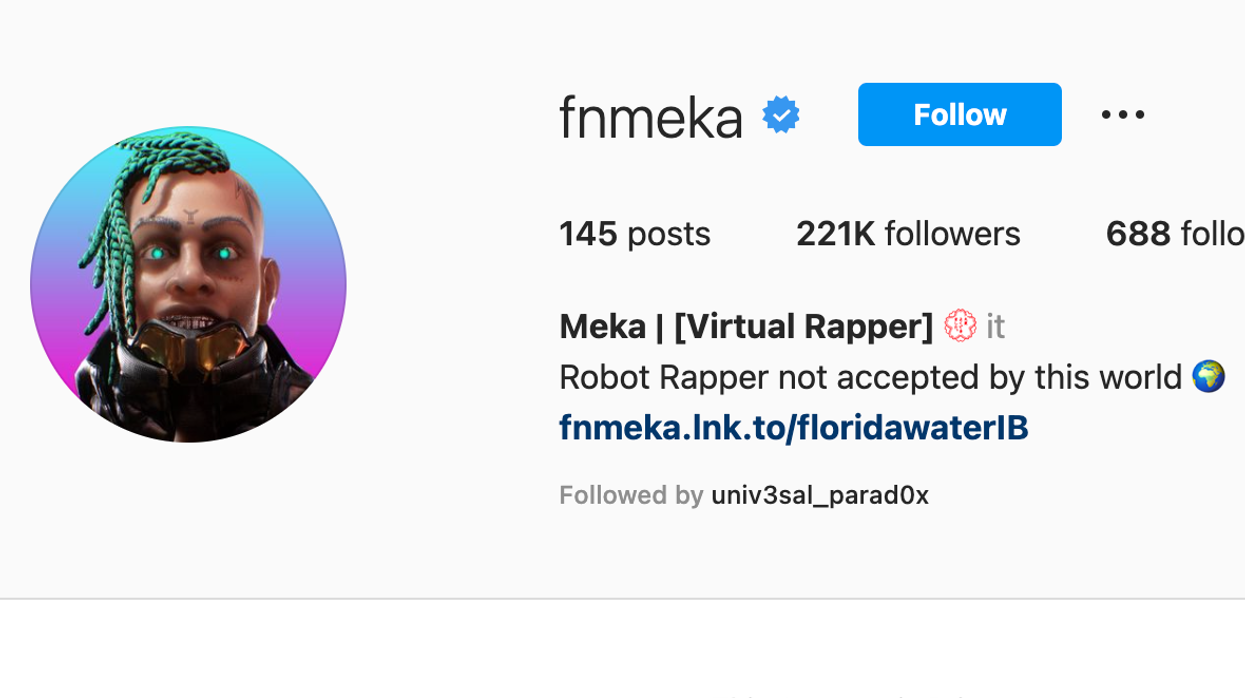What We Can Learn From AI-Created Rapper FN Meka's Failed Capitol Deal

Almost as soon as it was announced, L.A.-based Capitol Records ended its partnership with FN Meka creator Factory New.
Meka is a virtual rapper that has racked up more than 220,000 Instagram followers and over 10 million followers on its TikTok. His social accounts features music and occasional depictions of police brutality and posts CGI videos highlighting a fictional lifestyle that includes private jets and absurdly tricked-out luxury cars.
Social media backlash accused the character’s creators of spreading negative stereotypes and exploiting the real-life rapper Kyle the Hooligan, whose voice was used as the basis for Meka.
The controversy was embarrassing for Capitol Records and for Factory New, a “virtual influencer” music promotion company that creates and promotes virtual entertainers. Factory New, which also used Meka’s TikTok to shill NFTs, was launched in 2020 by music executive Anthony Martini and Brandon Le.
The catalyst that prompted close scrutiny of FN Meka and its creators was an Instagram post on Meka’s now-private account depicting a police officer beating the green-haired character on a jail cell floor. A screenshot of the image went viral on Twitter. Capitol quickly backed out of the deal.
Industry Blackout—an organization that describes itself as a “unified body of black people in the industry committed to changing the community”—called the rapper a “digital effigy” and “careless abomination.” In a statement posted on Twitter, Industry Blackout added that it found “fault in the lack of awareness in how offensive this caricature is.”
Meka was “a direct insult to the Black community and our culture,” the statement read, in addition to being “an amalgamation of gross stereotypes” and “appropriative mannerisms.”
On Sunday, Kyle the Hooligan, the artist who provided Meka’s voice and helped write music for the character, told TMZ Hip Hop that he was done with Factory New.
The rapper said he’d decided to cut ties because he gave the character a voice and had a role in writing the character’s music after the company promised him equity—but according to Andrew Orcutt, Kyle’s legal rep, his client has not “received any formal offer for compensation.”
Though he helped create Factory New, Anthony Martini—an ex-hardcore singer turned music executive—also stepped away. In a statement published by Stereogum, Martini insisted that Meka’s “vocals have always been written and performed by humans, which in this case, have been black voices–to be clear.” He went on to say “virtual characters have the potential to be a true equalizer and the next frontier in representation in the arts,” and “virtual avatars can and should enable MORE artists to have a platform, not fewer.”
For its part, Capitol Records apologized, telling The Hollywood Reporter that they offered their “deepest apologies to the Black community for our insensitivity in signing this project without asking enough questions about equity and the creative process behind it. We thank those who have reached out to us with constructive feedback in the past couple of days—your input was invaluable as we came to the decision to end our association with the project.”
AI-created characters and music aren’t new, and some have been notably successful. Miquela, AKA @lilmiquela, was created in 2016 by Los Angeles-based startup Brud and quickly embraced by the fashion world. By 2018, Miquela was listed among TIME magazine’s “25 Most Influential People on the Internet.” The character has become an Instagram fashion influencer with over three million followers.
Lil Miquela was a bellwether of things to come in AI and virtual characters. There’s now an entire class of Virtual YouTubers or VTubers—entertainers that exist as computer-generated avatars created by various combinations of motion capture and sometimes artificial intelligence.
But if the saga of FN Meka proves one thing, it’s that virtual characters present a kind of Wild West of new ethical considerations. It’s an exciting and still-new frontier, but with each project, there’s always a chance that the creator’s intentions won’t align with the creation’s impact.
- AI Will Soon Begin to Power Influencer Content - dot.LA ›
- The Soundcloud Story: Why AI Is Recommending Your Next Song - dot.LA ›
- Who is FN Meka? @fnmeka, explained ›
- Capitol Drops AI Rapper FN Meka Following Backlash - The New ... ›
- FNMeka (@fnmeka) Official TikTok | Watch FNMeka's Newest TikTok ... ›
- Kyle the Hooligan, the Black Rapper Behind FN Meka Says He's Suing ›
- Meka | [Virtual Rapper] (@fnmeka) • Instagram photos and videos ›





 Image Source: Skyryse
Image Source: Skyryse